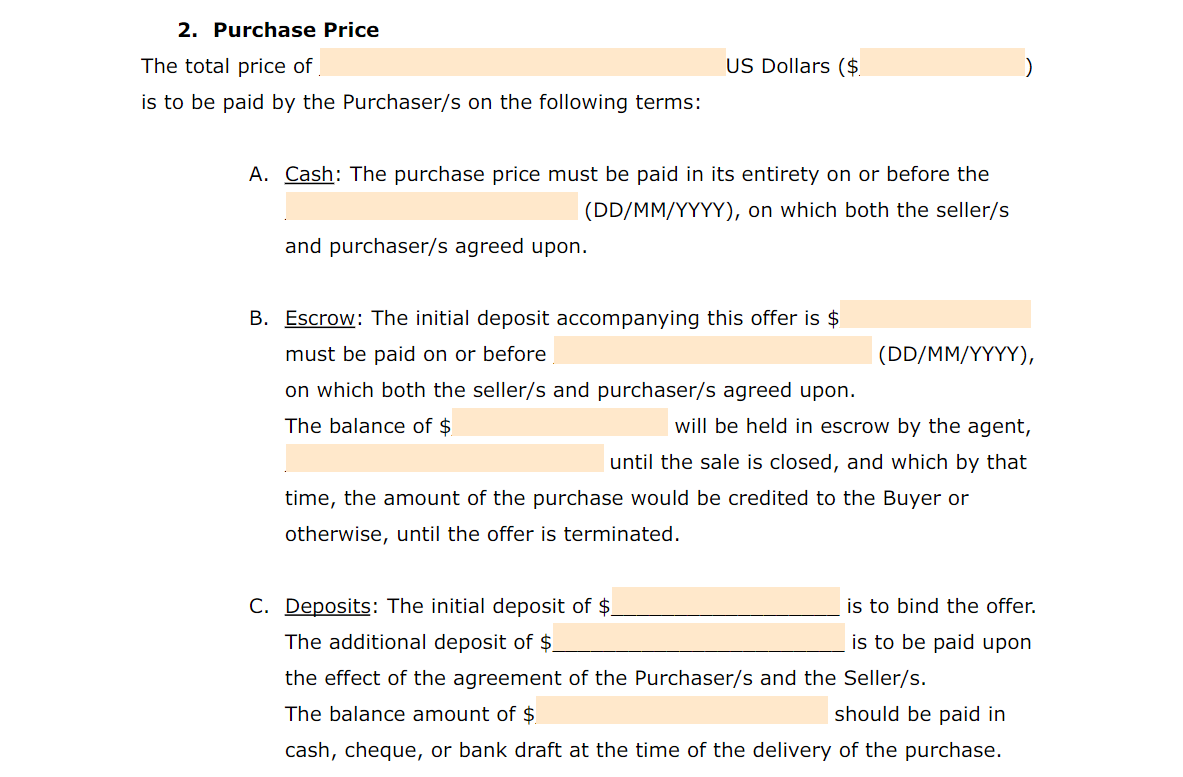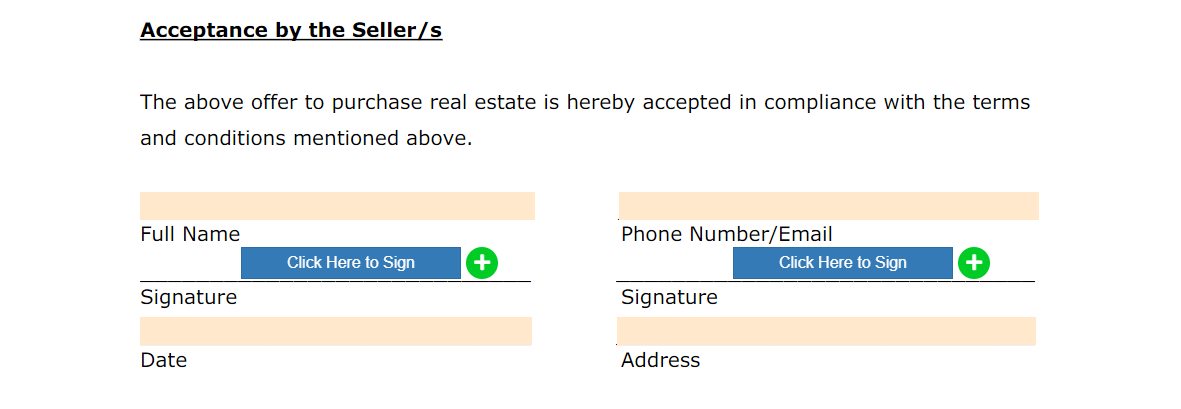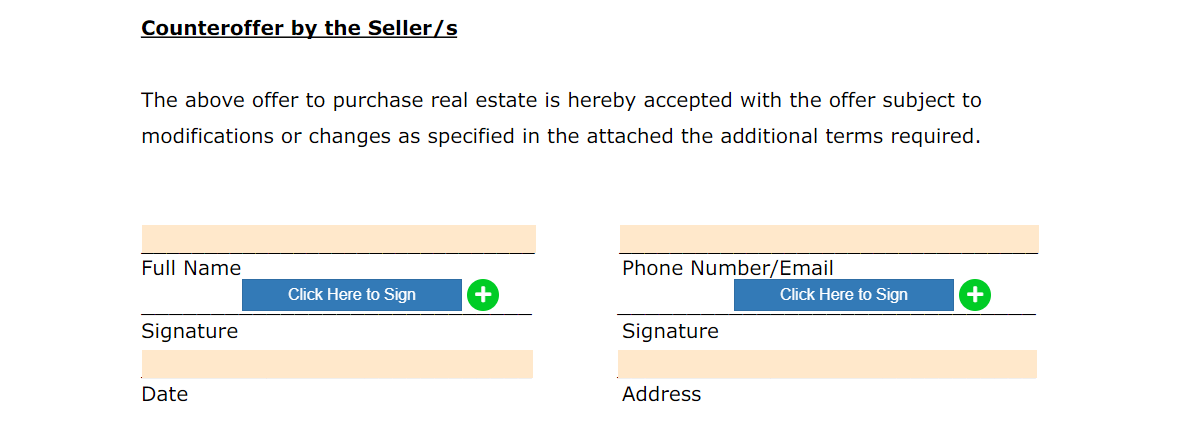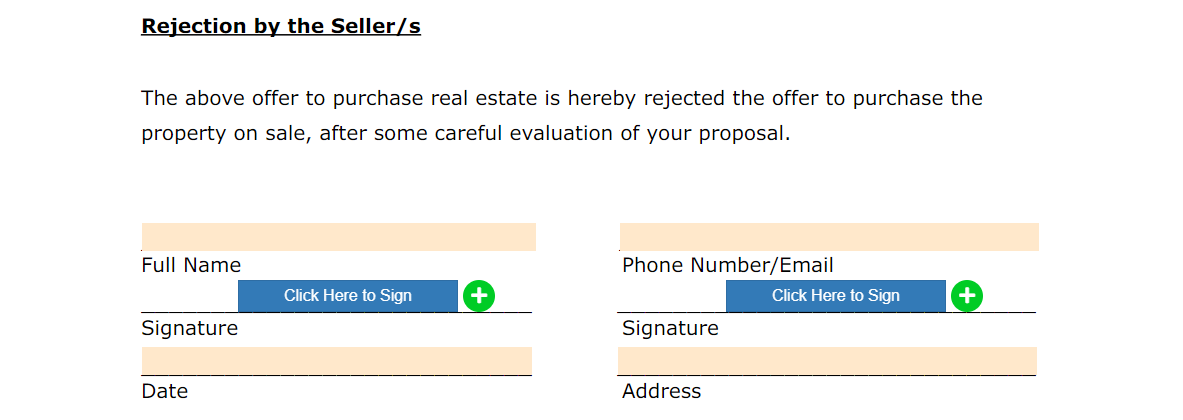Fillable Form Offer To Purchase
An Offer to Purchase is a written contract that is used to set out the intent of a buyer to buy a property. It is the property seller's decision if he or she will accept the Offer to Purchase.
What is an Offer to Purchase Form?
An Offer to Purchase Form is a legal document that contains the intent of the purchaser of real property or land to buy. Also known as Real Estate Offer Form, For Sale by Owner Offer Form, Home Purchase Offer Letter, and Real Estate Offer Letter, it is used to outline the details of a possible real estate transaction between two parties — the buyer and the seller.
An Offer to Purchase Form is used by the buyer to propose an offer on a house, land, or any private residence that is up for sale but has conditions that need to be met before a sale can transpire and be final. Using the form, conditions may be specified to set the stage for conducting a real property sale. In the simplest description, it acts as an agreement between the buyer and the seller before they proceed with the actual real estate transaction.
There are two types of offer a buyer can make in an Offer to Purchase letter; it can be a firm offer or a conditional offer. A firm offer intends to inform the seller that the buyer is willing to purchase the property without any specified conditions. If the seller accepts the firm offer, the two parties may proceed to the next process of the sales transaction without further negotiation. On the other hand, a conditional offer means that the buyer is willing to purchase the property with conditions. Necessary measures, including a home inspection, may be taken before the sale can be finalized.
Once the seller accepts the Offer to Purchase document created by the buyer, a contract for buying the property may then be created. Thus, all the conditions stated in the document must be reviewed properly by both parties to avoid future disputes and costly mistakes.
How to fill out an Offer to Purchase Form?
In general, an Offer to Purchase document will contain information about the buyer and the seller, such as their name, address, and contact information; the description of the real property or land to be purchased, including its official address; the price being offered for the property; investigation period; the proposed closing date and possession date; and the expiration of the offer. It may list other pertinent details on the potential sale, such as if the offer is subject to conditions that require the completion of a home inspection or a disclosure statement.
Using PDFRun’s fillable Offer to Purchase Form, you may create a legal document that lets you notify a seller of your intent to buy his or her real property or land. You may use the guide below to complete the form accurately.

The first step is to provide your (purchaser) name, the name of the seller, and the complete address of the property you wish to buy on the appropriate text boxes.

The Property asks for the complete address of the property you wish to purchase.

Purchase Price asks for the total amount you are offering to purchase the property. Under this section, you are to write important payment terms including the mode of payment, escrow, and deposits you will make.

Investigation Period asks for the total number of days upon the effect of the agreement for the seller to provide and perform all legal documentation needed for the transaction.

Closing and Possession asks for the date when the purchaser will have full possession of the property. This section also specifies the amount the seller shall pay the buyer for failure to transfer the property on time.

General Condition contains general conditions that both parties should adhere to. This may include state laws.

Offer Expiration asks for the date and the state the document was made, as well as the end date of the offer if not accepted.

To validate the document, the purchaser needs to provide his or her full legal name, phone number or email, and signature.
Once the seller has reviewed the Offer to Purchase letter, he or she can accept, request for a counteroffer, or reject the offer. He or she also needs to provide his or her full legal name, phone or email address, residential address, and signature to validate his or her response.



Acceptance by the Seller/s means that the seller accepts all the specified terms and conditions. Counteroffer by the Seller/s means that the seller accepts the offer but with modifications or changes. Rejection by the Seller/s means that the offer was refused after careful evaluation.
Frequently Asked Questions About An Offer to Purchase
Is an Offer to Purchase legally binding?
Yes, an Offer to Purchase is legally binding once it is accepted and signed by the seller. In most cases, both the buyer and seller must fulfill the terms of the offer if it is binding.
Your Offer to Purchase will become binding when a property seller accepts part of your offer and specifically tells you this in writing, normally in the Offer to Purchase itself.
An offer to purchase usually contains a time limit within which the property seller must accept it. If they do not, your offer lapses, and you lose any right to buy the property. That is why it is important to respond as soon as possible.
The Offer to Purchase and any and all attachments form what is known as a 'contract.' You must deal with property offers in the same way as any important legal contract. It means that you need to comply with relevant legislation.
Can a seller accept an Offer to Purchase orally?
No, a seller cannot accept an Offer to Purchase orally. The law requires a seller to accept an offer by written notice.
Once you make an Offer to Purchase, the property seller has only a limited amount of time in which they can accept it. If the seller does not respond within that time, your offer lapses.
An Offer to Purchase should be accepted in writing, by email, or fax. The seller might accept an oral Offer to Purchase if he or she does so clearly and unequivocally. In this case, however, you must provide written proof of acceptance within a reasonable time period for it to be binding.
Does the seller have to accept my Offer to Purchase?
The seller is not obligated to accept your Offer to Purchase.
The seller can decide whether or not to accept your Offer to Purchase. Thus, when you make an Offer to Purchase, it is reasonable to assume that you are serious about buying the property. It means that you should go ahead with other steps in preparing to buy a property, such as arranging, financing, and getting an appraisal report. If you change your mind, you should withdraw the Offer to Purchase in writing.
In some cases, the seller may make changes to your Offer to Purchase before accepting it. In these instances, an additional contract exists between both parties and generally follows the same rules as a house sale. Therefore, you should read all attachments and agreements made after signing the original offer to purchase.
If you feel unclear about anything, make sure to consult with a lawyer or notary and be aware of the risks involved in entering into such an agreement.
Can a seller just not respond to an Offer to Purchase?
Yes, a seller may choose not to respond to a buyer's Offer to Purchase. If this happens, your Offer to Purchase is denied and lapses after the time limit you specify.
The seller may not respond to your Offer to Purchase because there are other offers on the table, or he or she has already entered into an unconditional contract with another buyer. If this occurs, write a formal letter asking the property seller to communicate any other offers to you.
What is an Offer to Purchase property?
An Offer to Purchase property is just like any other commercial transaction in which you offer the seller a specific amount of money for a certain piece of property.
When you make an Offer to Purchase, it means that you are willing and able to buy the property being offered by making all terms part of your offer known both parties can agree upon.
How much time does a property seller have to consider an Offer to Purchase?
The seller has a limited amount of time in which to consider your Offer to Purchase. If you specify an expiration date, the property seller must respond within that time.
Usually, an Offer to Purchase must be accepted or acknowledged within three days after you send it. If you do not set a time limit, the seller has ten days to respond.
The property seller may agree to a longer period of time by adding it in writing. In this case, make sure that both parties sign and date the written agreement. It is a vital step because your Offer to Purchase becomes binding when both parties sign it.
How does a property seller accept an Offer to Purchase?
The most common way that a property seller accepts an Offer to Purchase is by sending the buyer notice of acceptance using either:
- registered mail,
- courier service, or
- electronic means such as fax or email.
Once the seller accepts your Offer to Purchase, the period of time in which you have to complete the sale agreement begins.
The property seller must also provide written proof that he or she has accepted your Offer to Purchase. It is usually done by sending a copy of the contracts and other documents relevant to your offer via registered mail, courier service, or electronic means such as email.
What if the seller responds negatively to my Offer to Purchase?
When you make an Offer to Purchase, the property seller has the right to accept or reject it. Thus, if your Offer to Purchase Letter is rejected, there are no rights or responsibilities between you and the property seller because your Offer to Purchase has not been accepted.
If the seller responds negatively, such as by stating that the offer is not acceptable because of the purchase price, you must try to compromise the sale price. Send another Offer to Purchase that offers a higher price than before. If the property owner or seller still rejects your Offer to Purchase, accept it and note that you are canceling the offer.
Whether your Offer to Purchase was rejected or accepted, you must remain on good terms with the property seller. After all, he or she may accept your offer in the future.
Can a property seller request changes to my Offer to Purchase?
Yes, a property seller may ask you to change anything from the time of signing your Offer to Purchase until you sign a purchase agreement with them.
However, a property seller can only make changes with your consent and upon mutual agreement. As a first step, you must tell the property seller if you intend to accept his or her offer as it is. If this happens, you should negotiate with the owner to arrive at a mutually acceptable price and other terms. If you do not want to accept it as it is, they may propose revisions and additions before making an Offer to Purchase binding.
The best way to deal with changes is to indicate them on your Offer to Purchase and respond as soon as possible. That way, you can avoid any misunderstandings or unnecessary delays.
It is better to honor any requests for changes because it shows that you are a serious buyer who will keep their end of a contract.
Can I withdraw my Offer to Purchase?
You may withdraw your Offer to Purchase at any time during negotiations between you and the seller. In this case, you must inform the seller in writing.
You have up to five days from the date of your Offer to Purchase to withdraw your offer with no legal consequences. It is a courtesy period and not mandatory as a legally binding contract exists only after both parties sign it.
A withdrawal is usually requested when the buyer finds that the property is overpriced or that the seller does not want to negotiate. Keep in mind that if you withdraw your offer and then resubmit it, there will be no legal consequences only if the property owner agrees to this change.
Once a property has been sold, for whatever reason, you cannot withdraw your Offer to Purchase unless:
- the property owner agrees to your withdrawal;
- you explain that you are withdrawing due to a material mistake or error in writing by the seller;
- the property owner has breached his obligations under the contract; or
- there are other similar grounds acceptable under the law.
Is an Offer to Purchase a vehicle legally binding?
Yes, an Offer to Purchase a vehicle is legally binding. It becomes legally binding when signed by both the buyer and the seller.
An Offer to Purchase a vehicle is a document specifically used to show intent to purchase a vehicle.
Since there are costs involved after signing your Offer to Purchase, you should choose whether to complete the sale or withdraw your offer before signing it. If you break your Offer to Purchase, you must compensate for any damages incurred by the property owner.
An Offer to Purchase is a simple contract that protects both parties. It sets the rules on how you should interact with each other during negotiations. It specifies your obligations, rights, and remedies if either of you fails to meet his or her obligation under the agreement. This document also contains provisions about alternative dispute resolution, which are meant to resolve or address problems or disputes outside the limits of the court.
Is an Offer to Purchase real estate binding?
Yes, an Offer to Purchase real estate is a legally binding document. It becomes legally binding when signed by both the buyer and the seller.
An Offer to Purchase real estate is a document used to express the intent of buying real estate, specifically in a real estate transaction.
Can an Offer to Purchase be canceled?
Yes, you can cancel your Offer to Purchase at any time before signing it. However, if you and the seller have signed the offer to purchase, the agreement is legally binding.
If you cancel it after signing, you must pay the seller an amount equal to the expenses he or she incurred as a result of your offer, provided that these are reasonable and customary in your circumstances. For example, the seller made repairs to the property you intended to buy as you instructed before showing it to you. He or she must be reimbursed for that cost.
The damages would depend on whether you breached your Offer to Purchase or your offer was revoked after it became legally binding. You will only have to pay these expenses if they are reasonable and customary in your circumstances.
Can an Offer to Purchase be signed electronically?
Yes, you can sign an Offer to Purchase electronically. You can use electronic signature software to sign it. It can be done if both parties have agreed to sign electronically.
Can a seller cancel an Offer to Purchase?
Yes, a seller can cancel or deny your Offer to Purchase. He or she can do this by telling you either verbally or in writing.
However, if the seller has signed the Offer to Purchase, it becomes a legally binding contract between you. The seller cannot cancel your Offer to purchase without your consent. You must be notified that your Offer to Purchase was withdrawn and that the seller is no longer willing to sell the property to you for the agreed-upon price.
You may be able to sue for damages if the seller refused to sell and you incurred costs or losses as a result.
How does an Offer to Purchase work?
An Offer to Purchase is a legal document that expresses your interest in purchasing a property. It might be used as evidence if the seller later claims that a contract was never finalized.
As part of the offer, you would indicate the property that interests you and how much you are willing to pay for it. You can also include any conditions or contingencies that would allow you to withdraw your offer before it becomes legally binding.
You should decide whether to sign the offer based on how much you are willing to pay for the property and what contingencies can be included. A contingency is something that must happen before a contract is finalized which allows you to cancel the offer if it does not occur.
An Offer to Purchase works best when the offer is clear about the property and price. The offer should also be contingent on certain events to avoid contractual disputes.
When does an Offer to Purchase expire?
An Offer to Purchase expires if a certain amount of time has passed and the seller has accepted it.
Typically, an Offer to Purchase is good for a specific amount of time, which should be stated in the letter. Most buyers allocate 24 to 72 hours for the sellers to respond. If the Offer to Purchase is not accepted or rejected within that time frame, it expires.
On the other hand, your Offer to Purchase will not expire if it was signed by both parties. It becomes a legal contract between you and the seller.
Who prepares an Offer to Purchase?
A property buyer usually prepares an Offer to Purchase.
The buyer may prepare an Offer to Purchase on his or her own, with the assistance of a real estate agent or broker, or have a lawyer help during negotiations. The buyer may also turn to online websites for assistance from professionals who prepare offers as part of their service.
The Offer to Purchase should be clear and concise so that both parties understand the terms. It should be written in plain language to avoid confusion or misinterpretation of any terms. No errors must be spotted on the Offer to Purchase before the seller signs it. A mistake might invalidate the entire Offer to Purchase, which could cause unnecessary problems during negotiations.
How does an Offer to Purchase benefit a buyer?
A well-prepared Offer to Purchase can offer protection against contractual disputes.
By writing up your offer, you can ensure that the contract terms are fair and prevent complications down the road. You will also know what steps must be taken before committing to buying the property.
You can also use the Offer to Purchase as a means to request repairs or additional details about the property, such as tax records and information on previous owners. If you decide later that you want to back out of the deal, you might have requested these details just in case.
How does an Offer to Purchase benefit a seller?
As a seller, you want to protect your interests by providing an offer. It is helpful, especially when there are multiple offers during the negotiation process.
When there is more than one offer, you will know which buyer wants the property and how much they can afford through an Offer to Purchase. An Offer to Purchase helps you identify the buyer's intent and ability to pay.
An Offer to Purchase also gives you security during the negotiation process. You know that an offer is legally binding only if you sign it, which means you do not have to worry about losing out on a sale if your buyer backs out of the deal.
What are contingencies in an Offer to Purchase?
The contingencies are terms or events that must be met before the Offer to Purchase is considered valid.
Before you sign an Offer to Purchase, the seller might require certain conditions to be met for it to be valid. These conditions are contingency items. Common examples of contingencies include financing, home inspections, and appraisals.
What will terminate an Offer to Purchase?
Several reasons can terminate an Offer to Purchase, depending on which party you are.
The buyer might not want to enter into a contract with the seller anymore for whatever reason. If this is his or her decision, it would be best to write up the formal notice of termination and submit it in writing before signing off on an Offer to Purchase.
On the other hand, the seller might decide to cancel the Offer to Purchase due to unforeseen circumstances or because he or she has accepted a better offer from another buyer. The seller must inform the buyer of his or her decision, especially if an agreement has been sealed beforehand.
Specifically, an Offer to Purchase can be terminated or voided if:
- the buyer and seller agree to cancel the contract;
- you change your mind and back out of the deal, which is called rescinding an offer;
- the seller accepts another offer;
- a contingency item related to financing is not met by a deadline;
- the seller agrees to make a counteroffer or change any of the terms and conditions.
When is an Offer to Purchase considered accepted?
An Offer to Purchase is accepted once the seller signs and dates it. Once this happens, you will want to confirm with your real estate agent when the closing date is.
Related articles:
Keywords: offer-to-purchase purchase-offer real-estate-offer real-estate-purchase real-estate-purchase-offer












